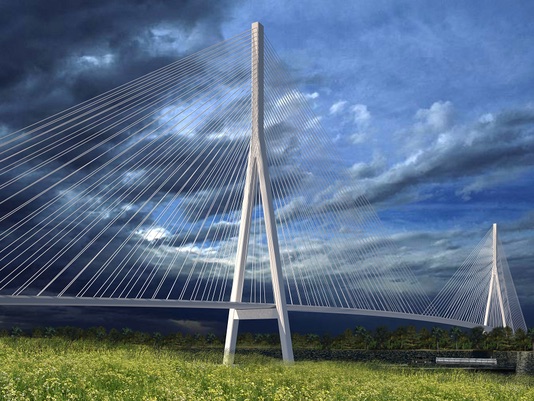The construction start date for the new Gordie Howe International Bridge linking Windsor and Detroit has run into another snag, and the culprit likely is Ambassador Bridge owner Manuel “Matty” Moroun — who happens to own 20 properties on the Detroit side of the bridge that either need to be purchased or expropriated for the work to proceed.
This means the original expected completion date of 2020 has become iffy, and the Windsor-Detroit Bridge Authority (WBDA) has stalled the finalist decision on which of the three short-listed international consortia will build the bridge.
“I won’t be held to a date,” WBDA interim chair Dwight Duncan told the Windsor Star.
Progress continues on the “enormously complex project,” Duncan said, with Ottawa, which is footing almost the entire bill, having committed $655 million towards the project this year, up from $138 million spent in 2015 and $8 million in 2014.
Duncan said a request for proposals to be issued to the three finalists announced in January is “ready to go” but that the 3,000-page document won’t be sent out until the bridge authority is confident all the potential risks have been mitigated.
The government-appointed bridge authority has received legal advice from both sides of the border and is confident “we’ll get access to these properties,” he told the newspaper. The risky part is how long it could take if there’s resistance and the matter has to be fought out in court.
Asked whether a government purchase of the Ambassador Bridge might be in play, Duncan wouldn’t say yes or no, only that there had been “two or three informal meets” over the past several months. There was no “Government of Canada mandate to proceed further,” he said.
The RFP for the final competition was supposed to be released in January. It still hasn’t happened.
According to the Star:
The request for detailed design proposals starts the clock ticking on the project, said the former Ontario finance minister. But getting the construction ball rolling before there’s sufficient assurance all the necessary properties are in hand can have “huge cost implications down the road — in the multimillion dollars a month,” said Duncan.
Only 423 of 963 properties on the Michigan side had been purchased, but bridge authority officials believe only 30 of the outstanding properties are at risk of being challenged legally.
Some of Mouron’s holdings are key properties, including a portion of the 42-acre Central Transport truck terminal, the former Yellow Freight hub in Delray, which Moroun acquired in 2010 long after learning that the new crossing would be built.
Moroun has fought the public bridge crossing proposal politically and legally from the start because it would end his bridge monopoly, which dates back to 1929. He instead is seeking approval for a six-lane twinning of his own span.
The requests for proposals to build the new publicly-owned bridge border crossing was supposed to come weeks after the three consortia finalists were announced in January, the Star reported.
“I don’t view these delays as major…. I see it as us being prudent,” Duncan said, adding the aim is to turn the entire site over to the winning proponent in a “ready-for-construction” state.
The Windsor Star story continued:
The main challenge with the 30 U.S. properties considered problematic is they host existing businesses which need new locations and time to move. In talks so far — even those involving the Moroun-owned properties — there has been nothing “adverse at this point,” Duncan said.
The expropriation process in Michigan is different than in Ontario. While the state has the power to take over properties, it’s done through the courts before judges. The government wins in the majority of cases, but decisions can be appealed. While a court fight can add years to the process, access to a property in dispute can be granted ahead of outright ownership being transferred.
The goal remains completing the bridge by “the earliest date possible,” Duncan said. He declined to be more specific.
“How can we have a finish date when we don’t even have the properties in hand?” he said.
The main challenge with the 30 U.S. properties considered problematic is they host existing businesses which need new locations and time to move. In talks so far — even those involving the Moroun-owned properties — there has been nothing “adverse at this point,” Duncan said.
The expropriation process in Michigan is different than in Ontario. While the state has the power to take over properties, it’s done through the courts before judges. The government wins in the majority of cases, but decisions can be appealed. While a court fight can add years to the process, access to a property in dispute can be granted ahead of outright ownership being transferred.
The goal remains completing the bridge by “the earliest date possible,” Duncan said. He declined to be more specific.
“How can we have a finish date when we don’t even have the properties in hand?” he said.

